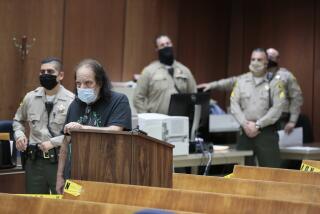Robert Downey Jr. Released From Prison by Appeals Court Ruling
- Share via
Actor Robert Downey Jr. was released from Corcoran State Prison on $5,000 bail Wednesday after an appeals court ruled that a Malibu Superior Court judge had made an error in the sentencing of the actor on drug charges.
A three-judge appellate court panel in Los Angeles ruled that Judge Lawrence Mira never stated whether Downey’s term for his felony cocaine possession conviction should be served consecutively with his sentences on misdemeanor drug and weapons charges.
The appeals court ruled that, under California law, if a trial judge fails to state whether sentences are to run concurrently or consecutively, “the second or subsequent judgment shall run concurrently.”
Robert J. Waters, one of Downey’s appellate attorneys, said he had “argued that the failure to say the felony sentence was consecutive means that the sentences run concurrently as a matter of law if the judge does not correct it in 60 days.”
Waters said that law “has been on the books at least 60 years. The penal code section applies to everyone, whether you are a celebrity or a house painter.”
Deputy Atty. Gen. Jeffrey B. Kahan called Downey’s release a technicality.
“People talk about [how] you get loose on a technicality,” Kahan said. “This is one of those. We’re talking about the [judge’s] failure to make a statement required by law. It’s just the absence of that statement in the record.”
Waters said Downey was entitled to 270 days’ credit for time served, and credit for an additional 53 days he spent in a rehabilitation program.
“Add that to the time he has spent in custody and it exceeds his three-year sentence,” Waters said.
Officials did not say where Downey went after his release. His lawyers said the actor is not expected to appear at a news conference Waters has scheduled for today.
The appellate court order releasing Downey came less than a week after the entertainer’s lawyers had urged the judges to do so.
In Downey’s appeal, his lawyers had argued that Mira had the discretion of imposing either consecutive or concurrent sentences for felony possession of cocaine.
“It appears [Downey] is correct,” Justice Michael G. Nott wrote for a unanimous panel. Mira believed that under California law, Downey had to serve his three-year felony sentence after he had completed his misdemeanor sentence, the appeals court said.
“This represents an incorrect understanding of the law, which imposes no such requirement,” Justice Michael G. Nott wrote.
Downey was first arrested in June 1996, when he was pulled over in his pickup and found to be in possession of cocaine, heroin and a pistol.
He was rearrested two weeks later, after he stumbled into a neighbor’s Malibu home under the influence of drugs.
Downey, who won an Academy Award nomination for his performance in the movie “Chaplin,” was placed on probation and ordered to undergo drug counseling. Treatment included two in-custody “lock-down” programs, two residential programs and two outpatient rehabilitation programs.
Downey violated his probation three times by failing to submit to drug testing, according to records.
Saying Downey was manipulative and had exhausted the court’s options for drug rehabilitation and the court’s patience, Mira sentenced the actor to three years in prison for repeatedly violating probation on the drug and weapons charges.
Downey was set to be paroled Nov. 2, but his lawyers said he should have actually been released more than five months ago.
The attorney general’s office has not yet decided whether to appeal the ruling, Kahan said.
*
City News Service contributed to this story.
More to Read
Sign up for Essential California
The most important California stories and recommendations in your inbox every morning.
You may occasionally receive promotional content from the Los Angeles Times.













